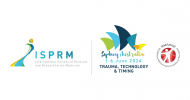Session outline
The United Nation Refugee agency currently estimates the number of refugees currently at 108.4 million many of whom have left their homes as a result of persecution, conflict, violence, huma rights violations or extremely disturbed public order. In 2010, the Office of the United Nations High Commissioner for Refugees (UNHCR, 2010) calls upon States and UN agencies to protect and assist refugees with disabilities against all forms of discrimination and to provide sustainable and appropriate support in addressing all their needs. This academic session will discuss the complexities and experience of those offering rehabilitation to refugees living with disability. Many refugees arrive with pre existing disabilities or develop disabilities both physical and mental during their plight. The session will offer three perspectives on the delivery of rehabilitation services for this vulnerable group. An Australian perspective providing rehabilitation to refugees who are sometimes housed in immigration detention, an Italian perspective of treating refugees often after traumatic sea voyages and a Bangladeshi perspective on how to offer rehabilitation to refugees living in camps.
Learning outcomes
- Attendees will gather an understanding of the rehabilitation needs of refugees living with disabilities.
- Attendees will gather an understanding of ways to introduce rehabilitation to refugees with disabilities often with variable health literacy and expectations.
- Attendees will gather an understanding the ways to engage with refugees in situations when government support for health initiative in refugee groups fluctuates.
- Attendees will gather an understanding the role of mental health treatments in multidisciplinary rehabilitation initiatives for refugees.
- ways to analyse patient history and examination in order to select patients for particular medications.
- Attendees will gather an understanding of risks and likelihoods for poor outcomes when patients embark on treatments for which they are not ideal.
Target audience
We expect that this short workshop will be attractive to
- Administrators
- Policy makers
- Rehabilitation Physicians
- Allied health
- Medical practitioners
- Students
- Trainees
- Nursing staff


